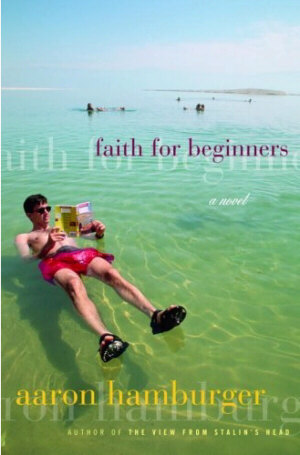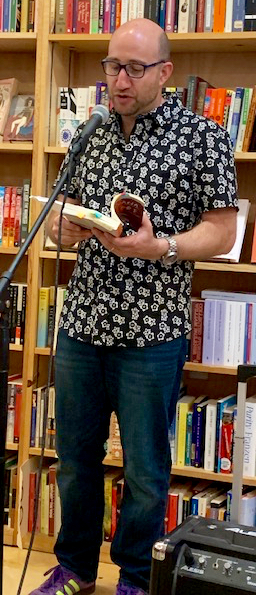I was not the only person to be impressed by Aaron Hamburger’s debut collection of stories, The View from Stalin’s Head, in that it won him the Rome Prize and a year’s residence at the American Academy in Rome . The story from that collection that I liked the best, the last one, “Law of Return,” might, I thought, be expanded, and sort ot was into his first novel Faith for Beginners. That story was the only one not set in Prague. It involved a gay Jewish American who lived in Prague visiting Israel and finding romance.

Faith for Beginners involves a Midwestern (Michigander) Jewish family (mother, father, gay son) on a package tour of Israel in 2000. The father, who had been a clinical psychologist, has terminal cancer. His wife and son have erotic/romantic adventures in Israel. Helen Michaelson’s is with a very hirsute rabbi who migrated from the US and is leading the tour along with his mother. (The trip was inspired by her reading in the Detroit Jewish News about troubled youths who “find themselves”, community, and/or sense of their heritage on “Missions to Israel” and wants her husband to experience Israel before he dies.)
Jeremy, a fifth-year Columbia undergrad who had recently nearly overdosed, attempts to pick up Noam, a Hassidic student, at the Wailing Wall, but gets shunted off to a strange Sabbath dinner with another group of tourists to Jerusalem, and later is picked up in Independence Park after dark by a deaf Arab who has taken the name “George” and works in a school for the deaf. He also has a foot fetish (a soccer sock fetish to be more exact) that puts Jeremy off, though Jeremy appreciates George’s initiative and ardor. George takes Jeremy home to the Arab village in which he lives, setting up a conversation in Hebrew (a language in which neither is very comfortable) between Jeremy and George’s mother over breakfast while George showers.
George writes some endearingly not-quite grammatical notes to Jeremy. These seem to reflect Hamburger’s experience as an English tutor in Prague and his journeys and residences outside the US.
The comedy between Anglophones abroad that was the specialty of E. M. Forster is transferred from pre-WWI Italy and India to Israel ca. 2000. About two-thirds of the way through, there seemed to be heavy influences of A Passage to India, though the Marabar Cave episode and the trial of an unjustly accused local in Hamburger’s novel are split (but not entirely unrelated, not least in that Michaelsons are involved in both). I was disappointed at the lack of follow-through (Jeremy’s more than Hamburger’s) with the juridical proceedings against the local who clearly did not commit the offense with which he was charged. Although I thought the novel could have been pruned of some descriptive passages, the ending still seemed a bit rushed to me. (And the reversal of the story of Samson seemed just a bit forced.)
Nevertheless, the rich portrayal of characters of diverse backgrounds and the intricate plotting kept me entertained and turning the pages. Hamburger seems to me rather hard on Jeremy’s callowness (and attitudinizing and inability to understand how his nose-ring and dress scream “American!”). The inclusion of sex scenes, even though they are not particularly graphic, has prompted some of the “faithful” to denounce the book as “pornography.” It most certainly is not that, and the charges have not received sufficient publicity to stimulate sales, apparently. (Both Jeremy and his mother have eyes for attractive males… and for the inequalities between Jews and Arabs in Israel. I wonder if it is the latter that has provoked some to criticize the sex scenes…)

(photo of Aaron Hamburger, ©2019, Stephen O. Murray; btw he was already bald in the 1995 author photo in Faith for Beginners)
BTW, I do not see the book as about religious faith (Jewish or Muslim). Perhaps about building self-confidence (faith in oneself). I think the book would better have been title “Jerusalem for Beginners” or “Israel for Beginners”… the title for my review being too obvious in echoing Forster’s masterpiece.
© 19 March 2006, Stephen O. Murray

